Meet Our Available Puppies
Find the perfect ‘tail’ for your story!
The Puppy You've
Been Waiting For.
Product Title Here
Put a bird on it tumblr trust fund sustainable williamsburg green juice.
Product Title Here
Put a bird on it tumblr trust fund sustainable williamsburg green juice.
Product Title Here
Put a bird on it tumblr trust fund sustainable williamsburg green juice.
Product Title Here
Put a bird on it tumblr trust fund sustainable williamsburg green juice.
Product Title Here
Put a bird on it tumblr trust fund sustainable williamsburg green juice.
Product Title Here
Put a bird on it tumblr trust fund sustainable williamsburg green juice.
January 13, 2025
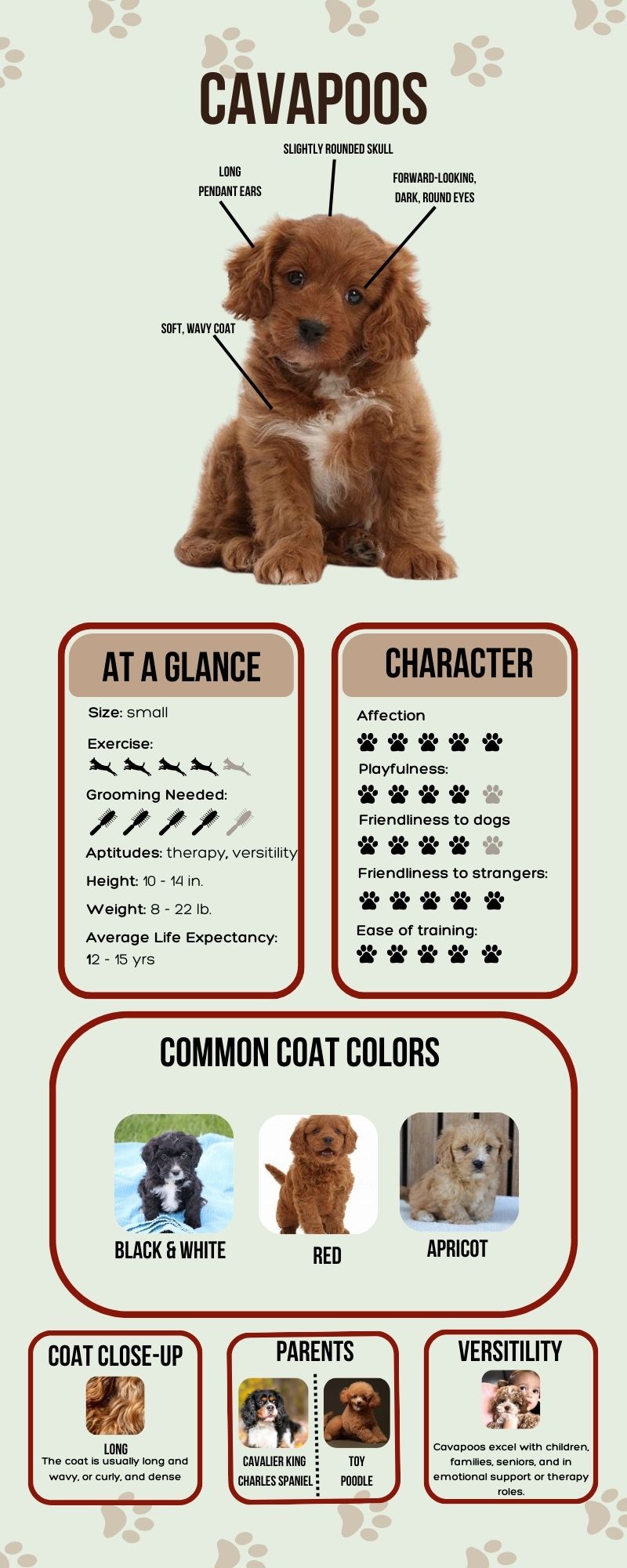
Cavapoo puppies, a delightful crossbreed of the Cavalier King Charles Spaniel and the Poodle, have captured the hearts of dog lovers everywhere. These affectionate, intelligent companions are known for their playful personalities and low-shedding coats. However, like all breeds, Cavapoo puppies can inherit certain cavapoo health problems from their parent breeds. Understanding these potential issues can help you ensure your furry friend lives a long, healthy, and happy life.
Common Cavapoo Puppies Health Problems
While Cavapoos are generally considered a healthy breed, being aware of common cavapoo health problems associated with their lineage is crucial for early detection and management. Here are the primary health concerns to watch for:
While Storytail Dogs carefully selects parent dogs adn genetically test them, not every disease can be tested for or eliminated. Because of this, we recommend and offer the Free 30 day Trupanion Go Home Day Offer. You can learn more here about this offer that comes with each of our puppies https://storytaildogs.com/2025/01/24/trupanion-go-home-day-offer/

Where Do Cavapoo Puppies’ Health Problems Come From?
Understanding where health problems in Cavapoo puppies originate can help owners take proactive steps to care for their furry companions. Cavapoos, a crossbreed between Cavalier King Charles Spaniels and Poodles, can inherit health conditions from either parent breed. These genetic predispositions can include heart disease, patellar luxation, eye disorders, and issues like hip dysplasia. While hybrid vigor—common in crossbreeds—may reduce the likelihood of some inherited conditions, it does not eliminate the risk entirely.
In addition to genetics, environmental factors such as diet, exercise, and stress can influence a Cavapoo’s overall health. Puppies raised in poor conditions, with inadequate nutrition or limited socialization, may face a higher risk of developmental or immune system issues. Similarly, improper care during their early weeks, such as skipping regular veterinary checkups or vaccinations, can exacerbate potential problems.
At Story Tail Dogs, we believe education is key. By understanding where these cavapoo health problems come from, owners can work toward minimizing risks through informed care and a commitment to their puppy’s well-being.
Cavapoo Health Table: A Quick Reference
To help you spot and prevent problems early, here’s a visual guide to common Cavapoo health concerns:
| Condition | What to Watch For | How to Help |
|---|---|---|
| Hip Dysplasia | Limping, bunny hopping | Maintain healthy weight, avoid overexertion in puppies |
| Patellar Luxation | Skipping or dragging back legs | Surgical correction in severe cases, watch for pain |
| Mitral Valve Disease | Coughing, fatigue, labored breath | Heart screenings for parents, annual checkups |
| Progressive Retinal Atrophy (PRA) | Night blindness, cautious behavior | CERF eye exams, no cure but early diagnosis helps |
| Cataracts | Cloudy eyes, vision loss | Surgery if needed, keep eyes clean and monitored |
| Dental Disease | Bad breath, red gums, tartar | Brush regularly, dental chews, vet cleanings |
| Obesity | Weight gain, low energy | Measure food portions, daily walks, avoid excessive treats |
| Ear Infections | Head shaking, odor, redness | Weekly ear cleaning, especially in floppy-eared dogs |
1. Hip Dysplasia in Cavapoos
Hip dysplasia occurs when the hip joint fails to form properly, causing the joint to rub and grind instead of moving smoothly. Over time, this can lead to joint damage, discomfort, and mobility challenges. While hip dysplasia is more commonly associated with larger breeds, small- and medium-sized breeds like the Cavapoo can still inherit the condition from their parent breeds.
Symptoms of Hip Dysplasia in Cavapoos:
- Difficulty climbing stairs
- Limping or lameness in the hind legs
- Reluctance to run, jump, or play
- Noticeable discomfort or stiffness after exercise
Genetic Contributions to cavapoo puppies health problems:
Cavapoos are a mix of Cavalier King Charles Spaniels and Poodles, both of which can be prone to hip dysplasia. Studies have shown the following prevalence rates for hip dysplasia in these breeds:
- Cavalier King Charles Spaniels: About 15% of Cavaliers develop hip dysplasia to some degree, with approximately 5% experiencing debilitating forms of the condition (Orthopedic Foundation for Animals).
- Poodles: Standard Poodles are more affected, with roughly 11% diagnosed with hip dysplasia, while Miniature Poodles have a lower prevalence of about 3% (OFA data).
- Cavapoos: As a mixed breed, the exact prevalence of hip dysplasia in Cavapoos is less documented. However, responsible breeding can lower the likelihood significantly. Puppies from well-screened parents have reduced risks, as breeders carefully test for hip health through evaluations like the PennHIP or OFA scoring systems.
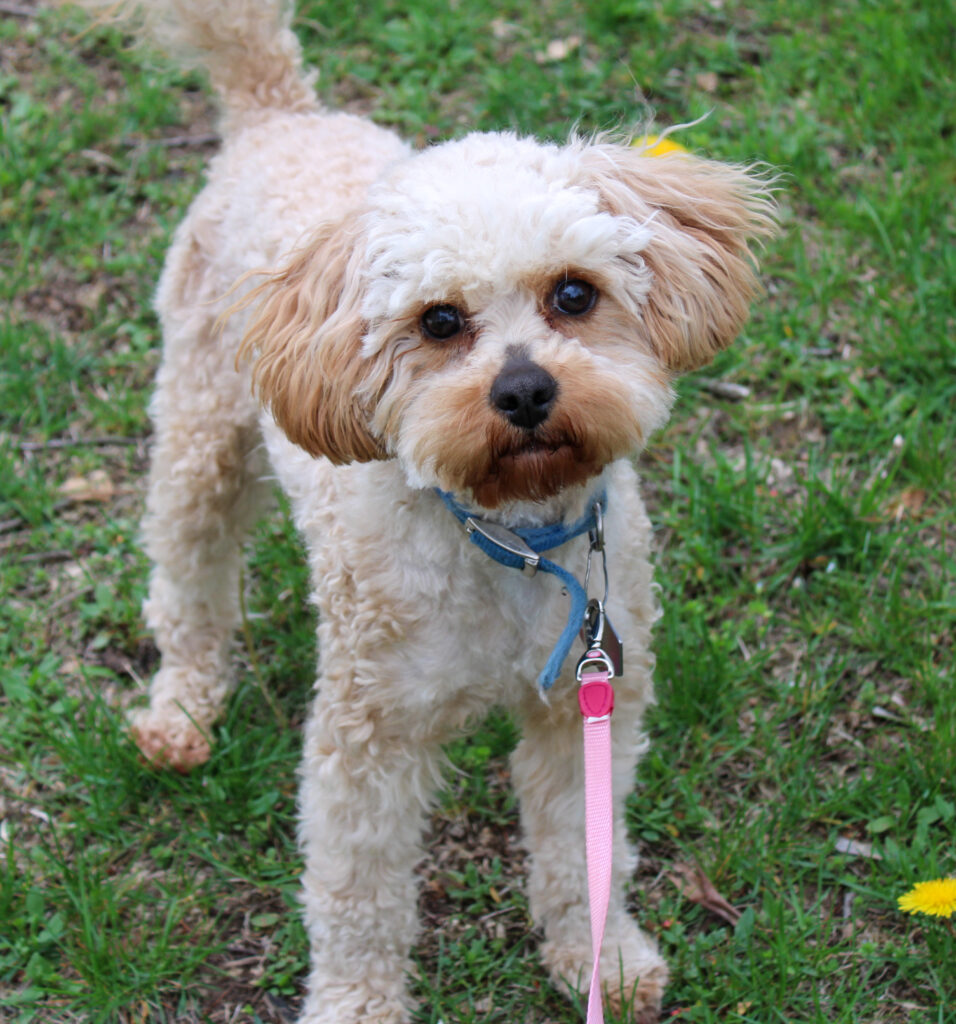
Prevention and Management of Hip Dysplasia
Preventative care plays a critical role in reducing the risk of hip dysplasia and mitigating its impact if it develops. By understanding what to do—and what to avoid—you can give your Cavapoo the best chance at maintaining strong, healthy hips throughout their life.
What You Should Do:
- Maintain a Healthy Weight: Keeping your Cavapoo at an ideal weight is essential to reduce stress on their joints. Use a body condition scoring chart to assess their weight, and avoid overfeeding, especially during their growth stages.
- Regular Low-Impact Exercise: Activities like swimming and controlled walking can help build muscle strength around the hip joint without placing undue stress on the developing skeleton. Allow puppies early off-leash play to naturally strengthen their hip joints.
- Nutritional Support: Joint supplements containing glucosamine, chondroitin, and omega-3 fatty acids may promote joint health and reduce inflammation. Consult your veterinarian for specific recommendations based on your dog’s needs.
- Veterinary Checkups: Schedule regular screenings with your veterinarian to catch early signs of hip dysplasia. Early intervention can slow progression and improve quality of life.
What You Should Avoid:
- Rapid Weight Gain: Avoid feeding your Cavapoo excessively during their growth stages, as rapid weight gain can put unnecessary stress on developing joints.
- Over-Supplementing with Calcium: Excess calcium during puppyhood may lead to improper bone development, so ensure your dog’s diet is well-balanced and age-appropriate.
- Early Neutering or Spaying: Consider waiting until your Cavapoo reaches physical maturity before neutering or spaying. Reproductive hormones play a key role in bone development, promoting proper growth plate closure and maintaining ligament and muscle integrity. Abrupt removal of these hormones could weaken joints and musculature.
- High-Impact Activities for Puppies: Avoid activities that strain developing joints, such as running on hard surfaces or excessive jumping, especially during the first year.
Advanced Treatment Options:
For severe cases, surgical interventions such as a total hip replacement or femoral head osteotomy may provide relief and improve mobility. These options are typically reserved for dogs experiencing significant discomfort or limited mobility due to hip dysplasia.
By combining responsible breeding practices, proactive management, and proper care, you can minimize the risk of hip dysplasia and ensure your Cavapoo enjoys a happy, active life. Although no preventative measures are foolproof, these steps significantly reduce the likelihood of severe outcomes.
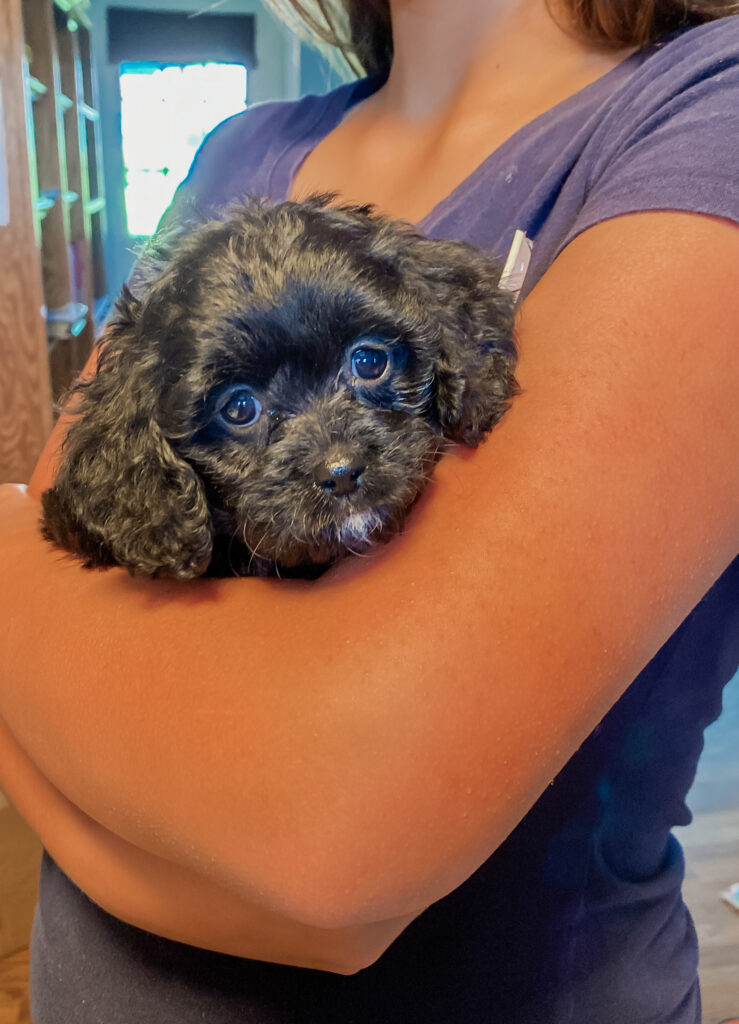
2. Patellar Luxation
Patellar luxation, or a dislocated kneecap, is a common orthopedic issue in small dogs like Cavapoos. This condition occurs when the kneecap slips out of its normal position in the groove of the femur. While patellar luxation may not always be painful in its early stages, untreated cases can lead to chronic discomfort, an abnormal gait, and the development of arthritis over time. Both parent breeds of the Cavapoo, the Cavalier King Charles Spaniel and the Poodle, have genetic predispositions to this condition. Studies show that up to 20% of Cavaliers and 5% of Poodles are affected by patellar luxation. Cavapoos, being hybrids, inherit a mixed likelihood, with an estimated 10-15%% prevalence when bred responsibly and with proper screening.
Signs to Look For:
- Skipping or Bunny-Hopping: Dogs with mild patellar luxation often skip steps or hop as they walk to adjust for the dislocated kneecap.
- Intermittent Limping: You may notice your dog limping, especially after physical activity.
- Difficulty Bearing Weight: In more severe cases, affected dogs might avoid placing weight on one leg entirely.
Treatment and Prevention:
- Mild Cases: Anti-inflammatory medications, physical therapy, and maintaining a healthy weight can alleviate discomfort and reduce the likelihood of further injury.
- Severe Cases: Surgery may be required to realign the kneecap and prevent long-term damage to the joint. Surgical success rates are high, especially when performed early.
- Preventative Measures: Regular veterinary checkups are crucial for early detection. Breeding practices that include thorough screening of parent dogs for patellar luxation can significantly reduce its prevalence.
By prioritizing health screenings and responsible breeding practices, Story Tail Dogs aims to minimize the risk of inherited conditions like patellar luxation in Cavapoo puppies. While no breeder can guarantee a completely risk-free puppy, early detection and intervention can make a significant difference in your dog’s quality of life.
3. Eye Problems
Cavapoos, like many small and designer breeds, can inherit several eye conditions from their parent breeds, the Cavalier King Charles Spaniel and the Poodle. Early identification and consistent care are essential to managing these issues effectively.
Common Eye Problems in Cavapoos:
- Cherry Eye: This occurs when the gland of the third eyelid becomes inflamed and protrudes, appearing as a red, swollen mass near the corner of the eye. Cherry eye is more common in younger dogs and can cause discomfort and excessive tearing.
- Progressive Retinal Atrophy (PRA): PRA leads to the gradual deterioration of the retina, ultimately resulting in blindness. Both parent breeds are predisposed to PRA, making it a concern for Cavapoos. This condition typically begins with night blindness and progresses over time.
- Cataracts: Cloudiness in the lens of the eye can impair vision and, if untreated, may lead to complete blindness. Cataracts are more commonly seen in older dogs, but they can occur earlier due to genetic predisposition.
Prevention and Care Tips:
- Regular Eye Exams: Schedule routine checkups with your veterinarian to monitor your dog’s eye health and catch potential issues early.
- Proper Grooming: Keep the hair around your Cavapoo’s eyes trimmed to prevent irritation. Use a damp cloth to gently clean away debris.
- Stay Alert for Symptoms: Watch for redness, squinting, discharge, or changes in your dog’s vision. Prompt veterinary care can address these issues before they worsen.
- Genetic Testing for Parents: Reputable breeders test parent dogs for conditions like PRA, reducing the likelihood of this problem in their puppies.
By taking these proactive measures, you can protect your Cavapoo’s vision and ensure their long-term eye health. While no breeder can entirely prevent genetic conditions, responsible breeding practices and regular veterinary care can significantly reduce the risk.
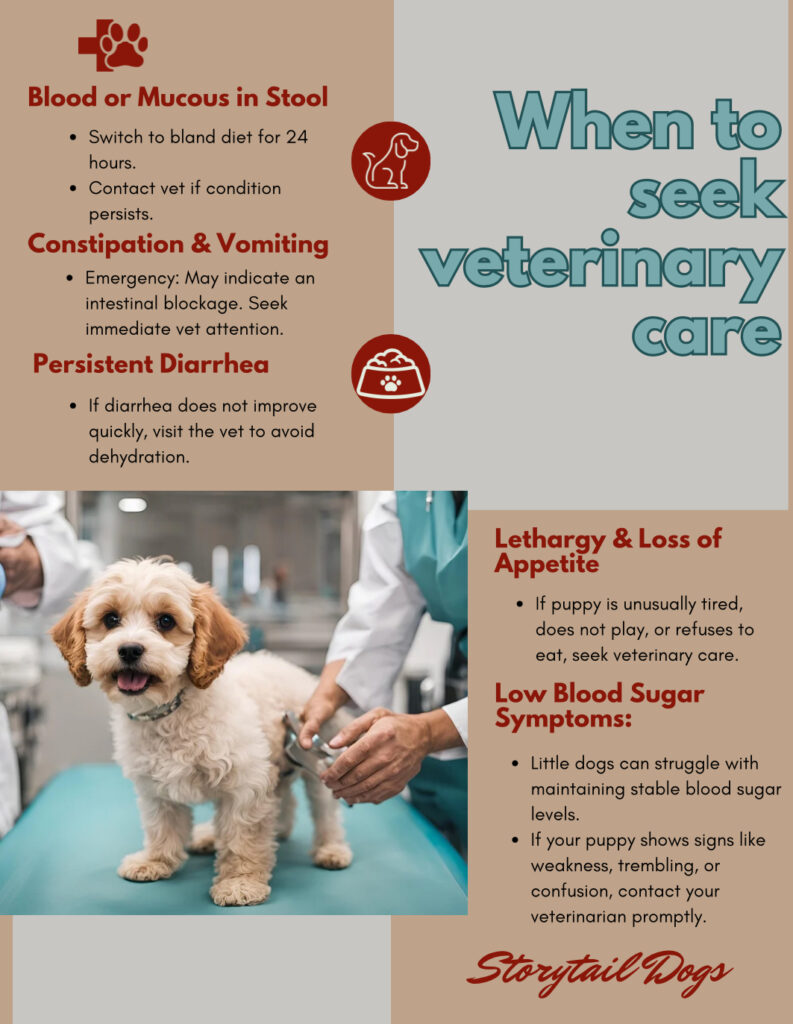
4. Dental Health Problems in Cavapoos
Small breeds like Cavapoos are more susceptible to dental disease than larger dogs. Cavapoos often develop tartar buildup due to the small size and crowded nature of their teeth. Without proper care, this buildup can lead to painful gum infections, tooth loss, and even systemic health issues, such as heart or kidney disease. The good news is that consistent dental care can significantly reduce the risk of these problems.
Prevention Tips for Healthy Teeth:
- Daily Tooth Brushing: Brushing your Cavapoo’s teeth every day is one of the best ways to prevent tartar buildup and gum disease. Use a soft toothbrush and a dog-safe toothpaste—never human toothpaste, which can harm your pet. Starting this routine early in life helps your dog become comfortable with the process.
- Dental Chews and Toys: Offering dental chews and toys specifically designed to reduce plaque can supplement brushing. These options help clean teeth and also satisfy your dog’s natural urge to chew. Look for products approved by the Veterinary Oral Health Council (VOHC).
- Regular Veterinary Dental Cleanings: Annual or biannual dental cleanings performed by your veterinarian can remove stubborn tartar that at-home care cannot address. These cleanings help prevent serious dental issues before they develop.
- Dietary Considerations: A diet that includes high-quality, dry kibble or specially formulated dental diets can help reduce plaque. Wet food may contribute to tartar buildup, so balance meals carefully.
Recognizing Dental Issues:
Keep an eye out for the following signs of dental trouble in your Cavapoo:
- Bad breath that doesn’t improve after brushing
- Red or swollen gums
- Difficulty eating or chewing
- Excessive drooling or pawing at the mouth
If you notice any of these symptoms, consult your veterinarian promptly. Early intervention can prevent minor issues from escalating into more serious health problems.
With consistent care, you can protect your Cavapoo’s teeth and gums, ensuring they stay healthy and happy. Dental health is more than just a cosmetic concern—it’s an essential part of your dog’s overall well-being.
5. Heart Disease in Cavapoos
Cavalier King Charles Spaniels, one of the parent breeds of Cavapoos, are highly prone to Mitral Valve Disease (MVD). This inherited heart condition involves the gradual weakening and deterioration of the mitral valve, which regulates blood flow between the heart’s chambers. Over time, this can lead to inefficient blood circulation, fluid buildup, and eventually, heart failure if left untreated. While MVD is most prevalent in Cavaliers, Cavapoos may also inherit a predisposition to this condition, making heart health a critical area of focus for their care.
Symptoms to Watch For:
Early detection is crucial for managing heart disease effectively. Be alert for these signs of MVD or other heart conditions in your Cavapoo:
- Persistent Coughing: Particularly noticeable at night or after exercise, this is often an early indicator of fluid buildup in the lungs.
- Difficulty Breathing: Labored or rapid breathing may point to heart strain or fluid retention.
- Fatigue or Decreased Energy Levels: Reluctance to exercise or a noticeable drop in activity levels can signal reduced heart efficiency.
- Appetite Loss and Weight Changes: Advanced stages of heart disease may cause appetite loss or significant changes in body weight.
Prevention and Management:
While there is no guaranteed way to prevent heart disease, proactive steps can reduce the risk or delay the onset:
- Start with a Reputable Breeder: Responsible breeders test their parent dogs for heart health and only breed individuals with clear screenings. This significantly reduces the likelihood of passing on heart conditions to their puppies.
- Routine Veterinary Exams: Regular checkups help detect early signs of heart disease. Most vets recommend annual exams, but older dogs or those with a family history of heart disease may require more frequent monitoring.
- Healthy Lifestyle Choices: A well-balanced diet and regular exercise promote overall cardiovascular health. Keep your Cavapoo at a healthy weight to minimize stress on the heart.
- Monitor for Symptoms: Early intervention is key to managing heart disease. If you notice symptoms such as coughing, fatigue, or breathing difficulties, consult your vet immediately.
Treatment Options:
For cavapoo puppies health problems diagnosed with MVD, treatment focuses on managing symptoms and slowing disease progression:
- Medications like diuretics and ACE inhibitors can help reduce fluid buildup and improve heart function.
- In severe cases, advanced diagnostic tests and specialized care from a veterinary cardiologist may be necessary.
With proper care and attention, many Cavapoos can lead full, happy lives even if they develop heart disease. Regular screenings and a commitment to heart health make a significant difference in their quality of life.

6. Allergies in Cavapoos
Cavapoos, like many other breeds, are prone to allergies that can cause discomfort and affect their overall well-being. These allergic reactions may present as skin irritation, chronic ear infections, or gastrointestinal problems. Identifying the triggers and managing the symptoms is essential to keeping your Cavapoo happy and healthy.
Common Allergy Triggers:
Several factors can cause allergic reactions in Cavapoos. The most common triggers include:
- Environmental Allergens: Pollen, dust mites, mold, and grass are frequent culprits. Seasonal changes may exacerbate symptoms, leading to itching or respiratory discomfort.
- Food Sensitivities: Ingredients like beef, chicken, soy, dairy, or grains can trigger food allergies. Symptoms often include gastrointestinal upset, skin rashes, or chronic ear infections.
- Flea Bites: Some Cavapoos have a heightened sensitivity to flea saliva, which can result in intense itching and inflammation, known as flea allergy dermatitis.
Signs of Allergies:
Be attentive to potential symptoms of allergies in your Cavapoo, which may include:
- Excessive licking, chewing, or scratching of the skin
- Redness, swelling, or hives on the skin
- Recurrent ear infections with redness, discharge, or a foul odor
- Vomiting, diarrhea, or other signs of digestive distress
- Watery eyes or frequent sneezing
Management and Treatment of Cavapoo puppies health problems:
Proper management begins with identifying the cause of the allergy. A tailored approach can significantly improve your Cavapoo’s quality of life.
- Consult Your Veterinarian:
Schedule a thorough evaluation with your vet to pinpoint the allergy trigger. Diagnostic tests like skin scrapings, blood tests, or elimination diets can help identify the source of the problem. - Address Food Sensitivities:
If food is the trigger, your vet may recommend a hypoallergenic diet or a limited-ingredient diet to eliminate potential allergens. Gradually introduce new foods to monitor for reactions. - Control Environmental Allergens:
- Wipe your Cavapoo’s paws and coat after outdoor play to remove pollen or grass.
- Use air purifiers and clean bedding regularly to reduce indoor allergens.
- Bathe your dog with vet-approved hypoallergenic shampoos to soothe irritated skin.
Flea Prevention:
Ensure consistent flea prevention measures, such as monthly flea treatments or flea collars. If a flea allergy is suspected, treat both your dog and their environment to eliminate fleas completely.
Medications and Therapies:
- Antihistamines: Over-the-counter or prescription antihistamines can help reduce itching and inflammation. Always consult your vet before administering medications.
- Topical Treatments: Specialized shampoos, sprays, or creams with soothing ingredients like oatmeal or aloe vera can provide relief.
- Allergy Shots: For severe cases, your vet may recommend immunotherapy to desensitize your dog to specific allergens over time.
- Monitor and Adapt:
Allergies may evolve, so regular follow-ups with your vet are crucial. Keep track of your dog’s symptoms and responses to treatment, adjusting the care plan as needed.
Prevention Tips:
- Choose high-quality dog food free from common allergens.
- Maintain a clean and allergen-free home environment.
- Stick to a regular grooming routine to minimize exposure to irritants.
By staying proactive and working closely with your vet, you can effectively manage your Cavapoo’s allergies, ensuring they remain comfortable and healthy.
7. Syringomyelia (SM) in Cavapoo Puppies Health Problems
Syringomyelia (SM) is a serious neurological condition that primarily affects dogs with a genetic link to the Cavalier King Charles Spaniel. Although it is considered rare, it is important to be aware of the symptoms and management options, especially for Cavapoos, who can inherit this condition from their Cavalier parent. SM occurs when fluid-filled cavities, known as cysts, form within the spinal cord, leading to a variety of symptoms and potential long-term issues.
Symptoms of Syringomyelia:
Syringomyelia can cause significant discomfort and impair a dog’s ability to move and function normally. The symptoms often worsen over time and may include:
- Scratching or Pawing at the Neck or Head: One of the most telling signs is the constant scratching or pawing at the neck or head. This behavior is typically due to intense pain or discomfort in the affected area.
- Sensitivity to Touch: Dogs with SM may become overly sensitive when touched, particularly around their neck, back, or head. Even gentle contact can cause them to react in pain.
- Wobbly or Uncoordinated Movement: As the cysts grow and put pressure on the spinal cord, dogs may exhibit uncoordinated or wobbly movements, especially in their hind legs. This may progress to difficulty walking or maintaining balance.
- Vocalization: Some dogs with SM may vocalize more frequently, especially when in pain or discomfort. This could include whining, yelping, or growling when touched or moved in certain ways.
Diagnosis and Treatment of Syringomyelia:
Diagnosing syringomyelia requires advanced imaging techniques, as it is difficult to detect through physical examination alone. The most reliable method of diagnosis is an MRI, which can identify the presence of cysts within the spinal cord. Once diagnosed, the condition is usually managed through a combination of pain management and surgical intervention in severe cases.
- Pain Management:
- Medications like corticosteroids or pain relievers may help manage discomfort and inflammation.
- Specific treatments, such as gabapentin, may be prescribed to address nerve pain caused by pressure on the spinal cord.
- Some dogs may benefit from anticonvulsant drugs to help manage any neurological symptoms like twitching or spasms.
- Surgical Intervention:
In severe cases, where the cysts are large or causing significant neurological impairment, surgery may be required. One option is decompression surgery, which relieves pressure on the spinal cord by removing part of the bone that is constricting it. While surgery can help improve mobility and reduce pain, it does not cure the condition, and ongoing management is necessary.
- Ongoing Care and Monitoring:
- Dogs with syringomyelia require regular veterinary checkups to monitor the progression of the disease and assess pain levels.
- Additional therapies such as acupuncture, physical therapy, or hydrotherapy may help manage symptoms and improve quality of life.
Prevention and Considerations:
As syringomyelia is an inherited condition, it is essential to choose a reputable breeder who tests for the condition in the parent dogs. Genetic screening can help reduce the risk of passing on the disorder to future generations. Even with responsible breeding practices, however, SM may still appear in some puppies, as the condition can be difficult to predict.
While syringomyelia can be a serious and debilitating condition, early detection and proper treatment can significantly improve your Cavapoo’s quality of life. Keep an eye out for any unusual symptoms and consult your veterinarian for an appropriate diagnosis and treatment plan.

Are Cavapoos Healthier Than Their Parent Breeds?
When looking at Cavapoo puppies health problems, cavapoos are often considered a healthier hybrid breed because they inherit traits from both the Cavalier King Charles Spaniel and the Poodle. However, like all mixed breeds, Cavapoos can still inherit health issues from either parent breed.
Cavalier King Charles Spaniels are known to be prone to heart conditions, such as Mitral Valve Disease, as well as syringomyelia, a neurological disorder. On the other hand, Poodles are generally healthy but can suffer from certain conditions like hip dysplasia, progressive retinal atrophy (PRA), and Addison’s disease.
While hybrid vigor, or the idea that crossbreeding can reduce the likelihood of inherited health issues, does apply to some extent in Cavapoos, they are not immune to the common health problems of their parent breeds. In fact, studies have shown that Cavapoo puppies may still inherit conditions like hip dysplasia and eye problems from their parent breeds. However, the likelihood of these conditions is generally lower than in purebred Cavaliers, especially when Cavapoo dogs are bred from parents that have been health-tested for common hereditary conditions.
Good breeding practices, such as health screening for both parents, can help minimize the risk of inherited conditions. Choosing a responsible breeder who tests for common health issues in both the Cavalier King Charles Spaniel and Poodle lines can lead to a healthier, more robust Cavapoo.
In conclusion, while Cavapoos may have fewer health problems than their parent breeds due to hybrid vigor, they are not guaranteed to be free from inherited conditions. Regular veterinary checkups, proper care, and responsible breeding are essential to ensuring the long-term health of your Cavapoo.
Is Hybrid Vigor Real for Cavapoos?
You’ve probably heard the phrase “hybrid vigor” tossed around when researching doodles like Cavapoos. It’s the idea that crossbred dogs are healthier than purebreds because they benefit from a wider gene pool. Sounds great, right?
Well… sort of.
While Cavapoos can inherit the best of both worlds from their Cavalier King Charles Spaniel and Poodle parents, that’s not a guarantee. Hybrid vigor isn’t automatic—it depends entirely on the health and genetic quality of the parent dogs.
In fact, a 2023 study from the Royal Veterinary College in the UK showed that crossbreeds don’t always have fewer health issues than purebreds (The Times). The takeaway? Crossbreeding doesn’t cancel out bad breeding practices. If the parents carry risk genes for heart disease or joint problems, the puppies might, too.
That’s why responsible breeders—like us at Storytail Dogs—still perform full health testing, regardless of breed mix. The goal isn’t just a cute puppy. It’s a healthy companion who thrives long term.
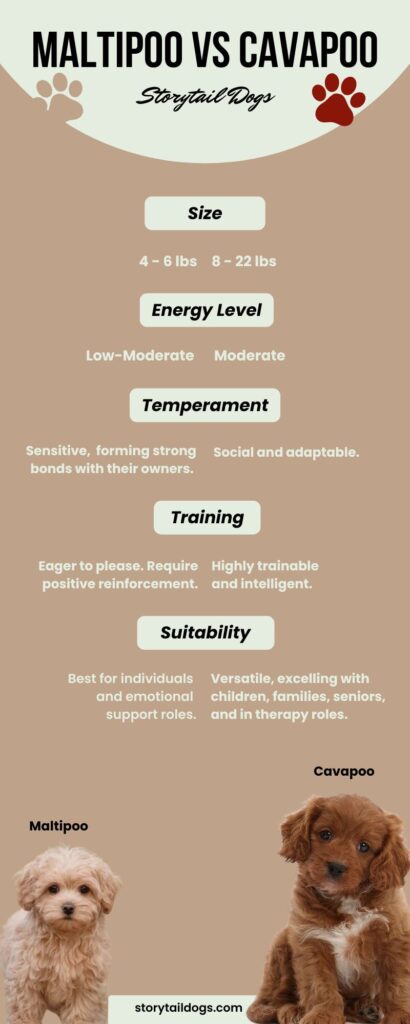
Are StoryTail Dogs Cavapoos Healthy?
While no breeder can completely guarantee the health of their dogs due to the complexities of genetics and the possibility of unforeseen health issues, Storytail Dogs takes every possible step to minimize health risks. We work with reputable, responsible breeders who prioritize health testing and screening for common inherited conditions in both parent breeds. By selecting parents with strong health histories, conducting genetic testing, and adhering to best practices in breeding, we reduce the likelihood of passing on hereditary issues. Additionally, we provide comprehensive care and early socialization for each puppy to promote a healthy, happy life. While we cannot promise a perfectly healthy dog, we are committed to giving our puppies the best possible foundation for a long, healthy life.
How to Keep Your Cavapoo Puppy Healthy
While these health problems can be concerning, proactive care can minimize risks and help your Cavapoo dog thrive. Here’s how:
- Choose a Reputable Breeder: Look for breeders who perform health screenings on parent dogs, including checks for heart disease, hip dysplasia, and eye problems.
- Regular Veterinary Checkups: Schedule routine wellness exams to catch potential issues early.
- Proper Diet and Exercise: Feed your puppy a high-quality, balanced diet and provide regular, age-appropriate exercise to maintain a healthy weight.
- Dental Care Routine: Prioritize dental hygiene to prevent oral cavapoo health problems.
- Monitor for Symptoms: Stay alert for signs of discomfort, changes in behavior, or unusual physical symptoms, and consult your vet promptly.
At Story Tail Dogs, we prioritize the health and well-being of our Cavapoo puppies by taking every possible step to mitigate or prevent common health issues associated with the breed. This begins with carefully selecting parent dogs that have undergone thorough health screenings for conditions such as hip dysplasia, heart disease, and eye disorders, ensuring a strong foundation for our puppies. We also provide early socialization, proper nutrition, and age-appropriate veterinary care to support their development. While we strive to reduce health risks, it’s important to remember that our puppies are living beings, and we can’t predict everything about their genetic makeup. However, we test for known health concerns and remain committed to producing healthy, happy companions for our families.

What to Feed Your Cavapoo to prevent Cavapoo Puppies Health Problems
Feeding your Cavapoo a balanced and nutritious diet is essential for their overall health, energy levels, and long-term well-being. Since Cavapoos are a crossbreed of the Cavalier King Charles Spaniel and the Poodle, they inherit traits from both breeds, influencing their dietary needs. Understanding the right nutrients and the amount of food your Cavapoo requires can help prevent obesity, maintain a healthy weight, and support their active lifestyle.
1. High-Quality Dog Food
Always opt for high-quality dog food that meets the nutritional standards set by the Association of American Feed Control Officials (AAFCO). Cavapoos thrive on food that provides balanced amounts of protein, healthy fats, carbohydrates, vitamins, and minerals.
- Protein: Protein should be the first ingredient in your dog’s food, as it supports muscle growth, repair, and energy levels. Look for sources like chicken, turkey, beef, or lamb.
- Healthy Fats: Fats, particularly omega-3 and omega-6 fatty acids, are essential for maintaining healthy skin, coat, and cognitive function. Fish oils and flaxseed are good sources of these beneficial fats.
- Carbohydrates: High-quality carbohydrates, such as sweet potatoes, brown rice, or oats, provide energy and fiber for digestion. Avoid foods with fillers like corn or soy, which offer little nutritional value.
- Vitamins and Minerals: Essential vitamins like A, C, and E, as well as minerals like calcium, phosphorus, and magnesium, support immune health, bone development, and overall vitality.
2. Portion Control and Feeding Schedule
Cavapoos are small to medium-sized dogs, so they don’t require large amounts of food. Overfeeding can lead to obesity, which places extra stress on their joints and can contribute to health problems.
- For puppies: Typically, Cavapoo puppies should be fed three meals a day until they reach six months of age. After that, two meals a day is sufficient.
- For adults: The amount of food varies depending on their age, activity level, and metabolism. On average, an adult Cavapoo will need about 1/2 to 1 cup of food daily, divided into two meals. Always follow the portion recommendations on the food packaging and adjust based on your dog’s weight and activity levels.

3. Special Dietary Needs to avoid Cavapoo Puppies Health Problems
While most Cavapoos do well with a standard diet, some may have special dietary needs, such as food sensitivities or allergies. In these cases, consult your veterinarian to select the best food for your dog’s specific condition. Common food allergies in Cavapoos include sensitivities to grains or proteins like chicken or beef.
- If your dog has a food sensitivity or allergy, you may need to opt for grain-free formulas or hypoallergenic dog food.
- For Cavapoos prone to dental issues, consider feeding them dry kibble that promotes dental health and helps reduce tartar buildup.
4. Treats and Snacks
Treats are great for training, rewarding good behavior, or simply showing your dog affection. However, treats should only make up a small portion of your dog’s daily intake—no more than 10% of their total calories. Choose healthy, low-calorie options like baby carrots, apple slices, or specially formulated dog treats. Always avoid giving your Cavapoo dog human food, especially toxic items like chocolate, grapes, raisins, onions, and garlic to prevent Cavapoo Puppies Health Problems.
5. Hydration
Always provide fresh, clean water to your Cavapoo throughout the day. Hydration is crucial for digestion, joint health, and overall well-being. Make sure their water bowl is accessible and replenished regularly.
6. Consult Your Veterinarian
If you’re unsure about your Cavapoo’s dietary needs or if they have specific health concerns, it’s always best to consult with your veterinarian. Your vet can recommend the best food options based on your dog’s age, weight, activity level, and any pre-existing health conditions. Regular check-ups are essential to monitor your dog’s weight and adjust their diet accordingly.
A well-balanced diet tailored to your Cavapoo’s unique needs is key to helping them live a long, healthy, and active life.
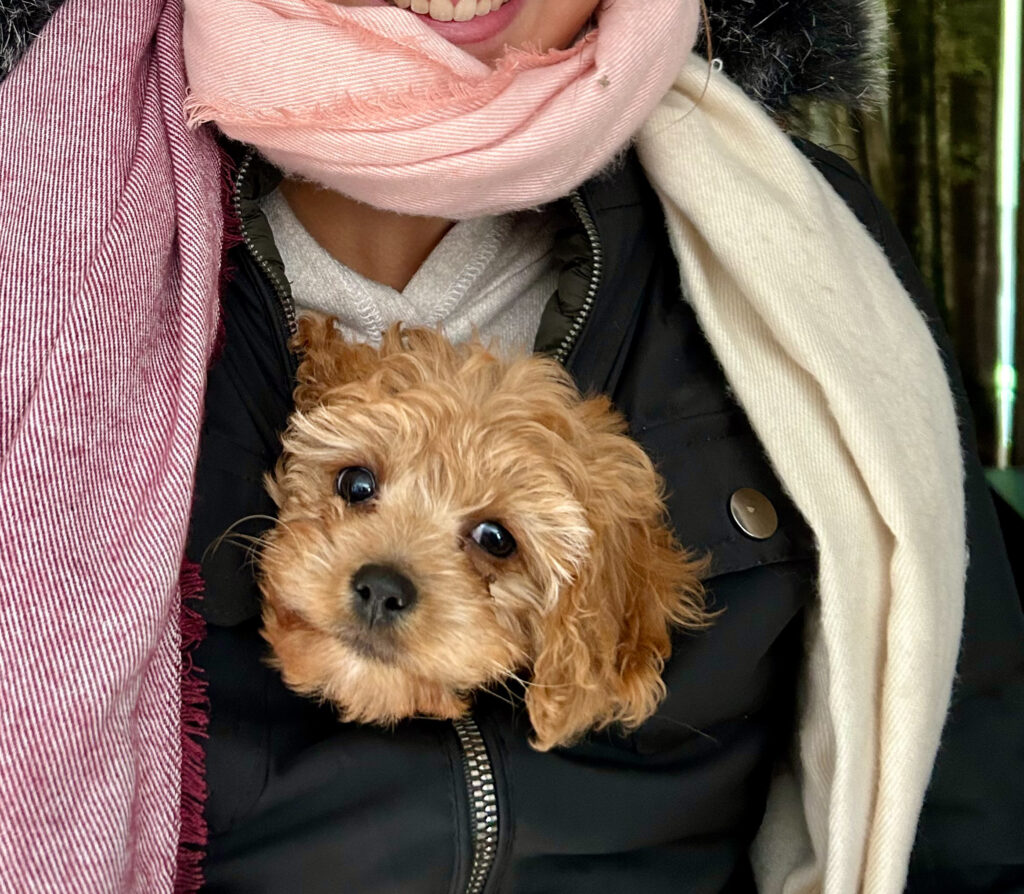
Choosing an Ethical Breeder to Reduce Cavapoo Puppies Health Problems
Selecting an ethical breeder is a critical step in ensuring that your Cavapoo puppy is healthy, well-socialized, and comes from a responsible background. The actions of a breeder can significantly impact the overall health and well-being of your puppy. An ethical breeder prioritizes the health, temperament, and quality of their dogs, and they are committed to breeding in a responsible manner. Here are some key factors to consider when choosing an ethical breeder for your Cavapoo.
1. Health Testing and Certifications
An ethical breeder will conduct thorough health testing on their breeding dogs to screen for common genetic disorders, ensuring that they are not passing on hereditary conditions to their puppies. For Cavapoos, this includes testing for conditions that can affect the Cavalier King Charles Spaniel and Poodle breeds, such as hip dysplasia, patellar luxation, heart disease, and eye problems.
- Ask for documentation of health testing, including reports for hip evaluations, patella checks, heart exams (such as for mitral valve disease), and genetic screening for inherited conditions.
- The breeder should be transparent about any health issues or genetic conditions in their dogs and provide clear information about how they work to minimize risks through responsible breeding practices.
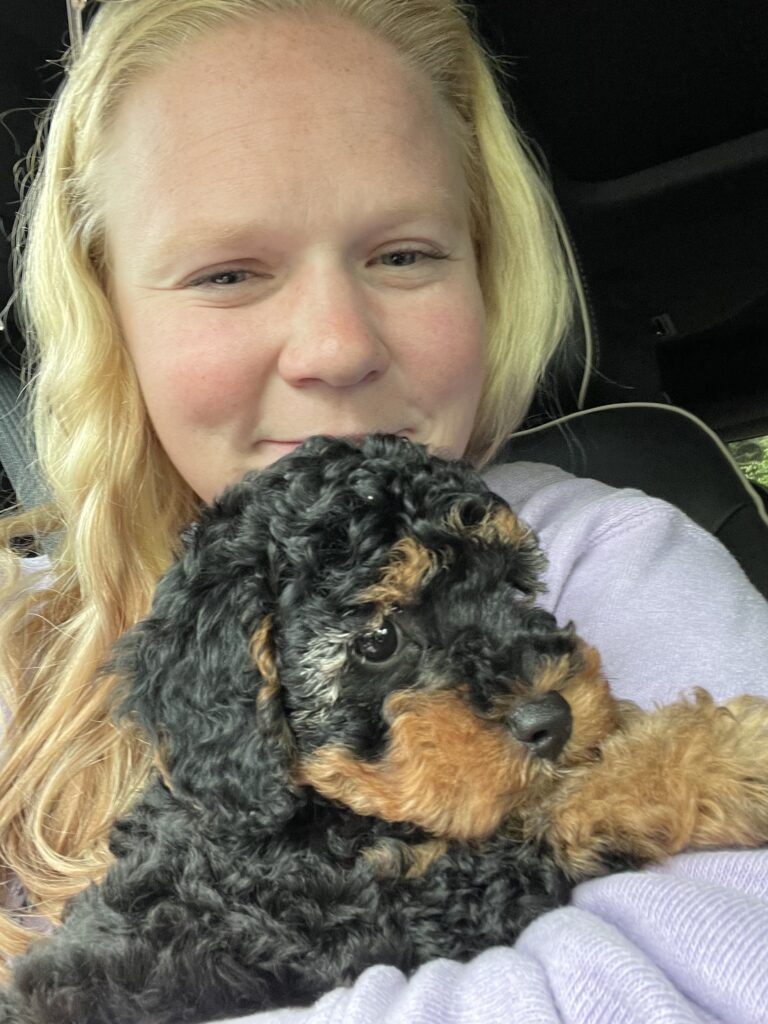
2. Focus on Temperament and Socialization
Ethical breeders understand that temperament plays a huge role in the development of puppies, especially in mixed breeds like Cavapoos. They will focus on breeding dogs with calm, friendly, and stable temperaments, which are important traits for therapy or family dogs.
- The breeder should raise puppies in a clean, stimulating environment with regular exposure to positive experiences, such as human interaction, household noises, and basic training. This early socialization helps puppies develop into well-adjusted and confident dogs.
- Ask how the puppies are socialized and what experiences they have before they go home with their new families. A reputable breeder will often begin the socialization process early to ensure the puppies are comfortable around different people, animals, and environments.
3. Responsible Breeding Practices to Reduce Cavapoo Puppies Health Problems
Ethical breeders do not breed their dogs indiscriminately. They carefully select breeding pairs based on health, temperament, and genetic compatibility to reduce the risk of hereditary health issues. Additionally, they breed with the goal of improving the breed standard, rather than for profit.
- A good breeder will not have scores of puppies available at once, as this can suggest a focus on quantity over quality.
- They will also avoid breeding dogs that are too young or too old, and they will limit the number of litters a dog has in their lifetime to ensure their well-being.
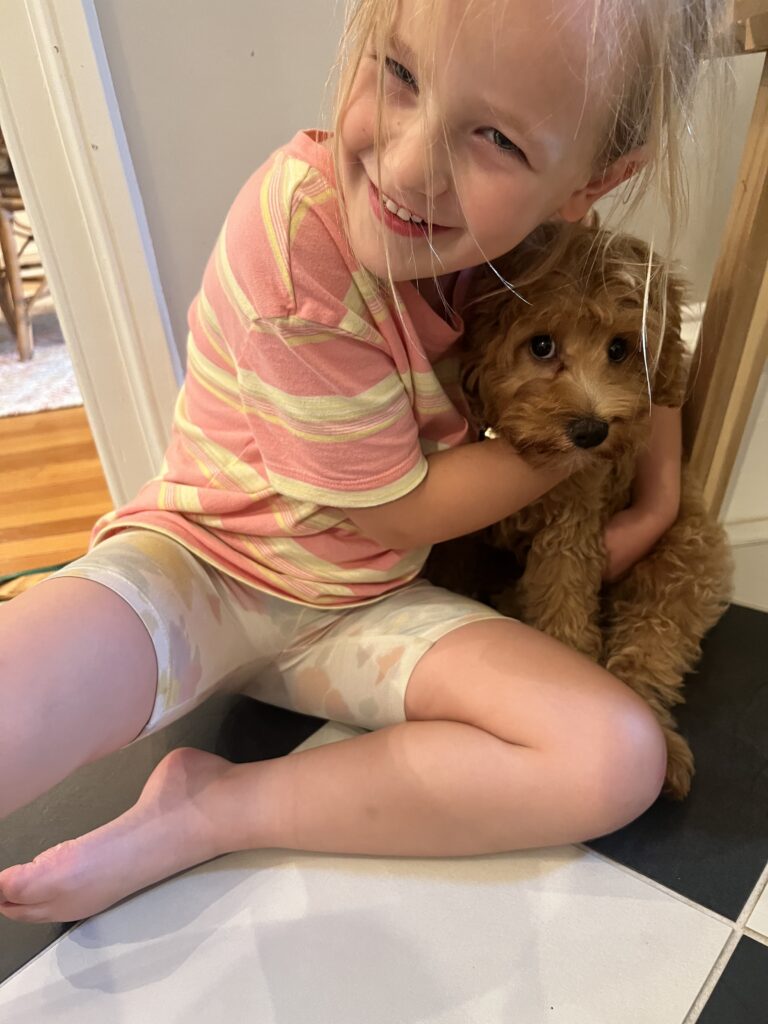
4. Clear and Transparent Contract
An ethical breeder will provide a clear, written contract outlining the terms of the puppy’s adoption, including health guarantees, return policies, and the breeder’s responsibilities.
- The contract should include a health guarantee, specifying that if any genetic health issues arise within a certain period (usually 1-2 years), the breeder will either provide a replacement puppy or offer a refund.
- The contract should also outline the breeder’s return policy, which should ensure that the breeder takes responsibility for rehoming a dog if the buyer is unable to care for it.
5. Positive Reputation and References
A reputable breeder should have a history of satisfied clients who can provide references. Ask for testimonials from previous puppy buyers and check online reviews or breeder directories from trusted organizations.
- Good breeders are usually members of breed clubs or associations that follow specific ethical guidelines, such as the American Kennel Club (AKC) or the Continental Kennel Club (CKC).
- A breeder who is well-known in the community for ethical practices will often be willing to provide you with references to verify their integrity.
6. Avoiding Puppy Mills and Backyard Breeders to Reduce Cavapoo Puppies Health Problems
Puppy mills and backyard breeders are focused on profit rather than the health and well-being of the dogs they produce. These breeders often lack proper health testing, fail to socialize puppies, and overbreed their dogs. Puppies from these sources can suffer from a wide range of health and behavioral issues.
- Avoid breeders who are unwilling to provide health testing documentation or those who are reluctant to answer your questions.
- Be cautious if a breeder has scores of puppies for sale at once or if they are willing to sell puppies without meeting you. A responsible breeder will want to know you are the right fit for their puppies.
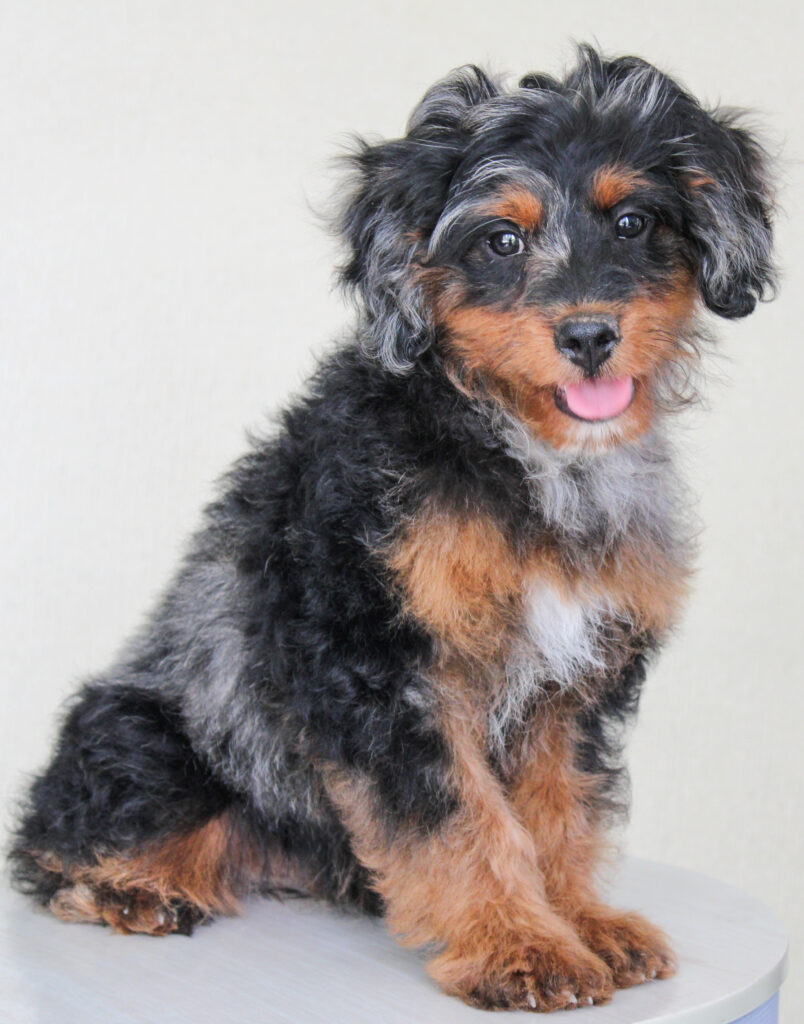
7. Breeding for the Right Reasons
A good breeder deserves to be compensated fairly for the time, effort, and care they invest in raising healthy, well-socialized puppies. However, the health and well-being of the dogs should always take precedence over profit. Ethical breeders breed with the intention of improving the breed, focusing on producing puppies with excellent temperaments, sound health, and a strong foundation for a happy life. When considering a breeder, ask about their goals and values in their breeding program. They should be able to explain how they prioritize the welfare of their dogs and ensure that each puppy is placed in a loving, responsible home.
So How do I find an ethical Cavapoo Breeder?
Choosing the right breeder is essential in providing your Cavapoo dog with a healthy, happy start in life. By researching and asking the right questions, you can ensure that you’re bringing home a puppy from an ethical breeder who is dedicated to the well-being of both their dogs and the families who adopt them. A responsible breeder’s care and commitment will not only impact your puppy’s health but also their behavior and temperament, setting the foundation for a long, happy life together. You can learn more about finding an ethical Cavapoo breeder here https://storytaildogs.com/2025/01/07/how-to-find-reputable-cavapoo-breeder/

Cavapoo FAQs
How big does a Cavapoo get?
The Cavapoo is a relatively small breed that’s usually 8–25 pounds and 9–14 inches tall. The Poodle side of this mix can be a Miniature Poodle or Toy Poodle, which can affect the size of your full-grown Cavapoo.
Is a Cavapoo hypoallergenic?
While the Cavapoo, like other Poodle mixes, is sometimes referred to as hypoallergenic, no dog is truly allergen-free. Because they’re bred to have low-shedding coats, though, they may be a better option for people with allergies than a breed that sheds heavily.
How long do Cavapoos live?
This little dog has an impressive lifespan that typically ranges 12–15 years.
How much do Cavapoos cost?
As a designer hybrid, the Cavapoo is not a purebred dog recognized by the American Kennel Club, and that can make it easy for disreputable breeders to get into the Cavapoo game. Reputable, professional Cavapoo breeders—who provide health guarantees based on recommended genetic testing—will likely charge $3,000–$8,000 for Cavapoo puppies, but that may fluctuate based on location and other factors.

Final Thoughts
Cavapoo puppies are delightful companions, blending the best traits of their parent breeds. By understanding the potential health problems they may face, you can provide the care and attention needed to ensure a happy, healthy life. The best way to reduce Cavapoo puppies health problems is to choose the right breeder, follow a healthy diet, and visit the vet regularly.
Remember, investing in your Cavapoo dog’s health today—whether through regular vet visits, proper grooming, or a nutritious diet—pays off in the form of years of love and companionship.
- OFA- “Disease Statistics”-https://ofa.org/diseases/disease-statistics/
2. Cavalier Health-“Hip Dysplasia in Cavalier King Charles Spaniels”-https://www.cavalierhealth.org/hipdysplasia.htm
3. Cavalier Health-“Eye Disorders in Cavalier King Charles Spaniels” https://www.cavalierhealth.org/eyes.htm
4. PetMD- “Cavapoo” –https://www.petmd.com/dog/breeds/cavapoo
5. NationWide-“ Oodles of Doodles Popularity and Health”- https://assets.ctfassets.net/440y9b545yd9/2xKSYWnUkxhb0tJGDLNdoI/fe9b401da2d73c6fef7c2a4bd4b8a49e/Nationwide_Oodles_of_Doodles_and_Cancer_Cross_Breed_White_Paper_2022.pdf
Leave a Reply Cancel reply
Storytail Dogs
A Dog For Your Story. Focused on READ dogs, therapy dogs, and resilient family companions.
@storytaildogs
© StorytailDogs 2024. All rights reserved. | Legal |